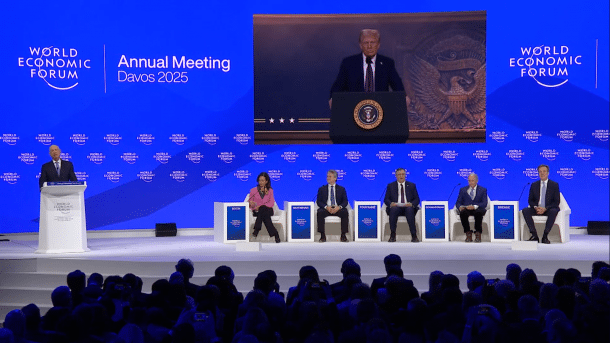US government: less influence on platform operators
By decree, the new US president wants to curb the government's influence on social media platforms. Critics warn of side effects.

He hovers above things: Trump's appearance at the World Economic Forum (WEF) in Davos.
(Image: Screenshot/Youtube)
During his video appearance at the World Economic Forum in Davos, US President Donald Trump emphasized that he would stop all US government interference in social media discourse. "On the first day, I signed a decree to end all government censorship," Trump said in his speech on Thursday, which was otherwise dominated by economic issues and self-praise.
Shortly after his inauguration on Monday, Trump issued a decree to "restore freedom and end censorship by the federal government". This prohibits the federal government and authorities from restricting US citizens' constitutionally protected right to free speech under "the pretext of combating misinformation or disinformation".
"Substantial coercion"
The previous US administration had exercised "significant coercion on third parties, such as social media providers, to moderate, remove or otherwise suppress speech that the government does not want", according to the executive order signed by the new US president on Monday. US Attorney General-designate Pam Bondi is now to investigate this and submit a report. Trump's nominee Bondi has not yet been confirmed for the post by the US Senate.
"Our government will no longer label the statements of our own citizens as misinformation or disinformation", said Trump, who was connected via video on Thursday at the World Economic Forum. "These are the preferred terms of those who want to stop the free exchange of ideas and progress."
The "Twitter Files"
While there is no evidence of direct censorship by the US government in recent years, insights into the "Twitter Files" compiled by US journalists show, among other things, that political pressure was exerted on companies via authorities or government-funded organizations.
During the coronavirus pandemic, the White House also exerted direct pressure on Twitter management. As a result, the social network restricted the opinions of even experts if they deviated from the government line. Twitter founder Jack Dorsey spoke out in favor of more freedom of expression at the time and called the blocking of Trump's user account a mistake.
Meta boss Mark Zuckerberg has also recently reported influence from the White House. In light of the change of power in the White House, Zuckerberg has ordered a change of course for his company and changed the moderation rules. While Meta in the USA has banned the so-called "fact checkers", they will remain in use in Europe for the time being.
Threats from the US government and federal authorities against platform operators have now also occupied the courts in the US. In a case in the US state of Missouri, the competent appeals court ruled in favor of the plaintiffs and restricted contact by government officials (Missouri et al v Biden et al, Ref.: 3:22-CV-01213).
Videos by heise
In the summer of 2024, however, the US Supreme Court overturned the judgment and the order of the court of appeals. The majority of the panel found that there was no evidence of a causal link between influence peddling and moderation decisions. In dissenting opinions, three judges considered this evidence to have been provided in at least one case (Case 23-411, Murthy v Missouri).
"Lies and conspiracy theories"
Nina Jankowicz from the lobby organization American Sunlight Project criticized to CNN that Trump was normalizing "lies and conspiracy theories" with his decree. Under their administration, Jankowicz briefly chaired the Disinformation Governance Board at the Department of Homeland Security, which critics described as a censorship agency and which was disbanded after a few weeks.
Moderate critics point out that much of the contact between authorities and platform operators concerns areas relevant to criminal law and not freedom of expression. These opportunities for exchange should not be restricted.
(vbr)